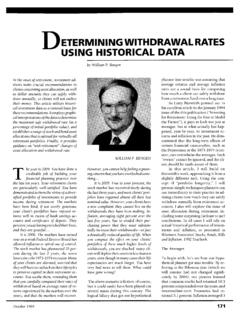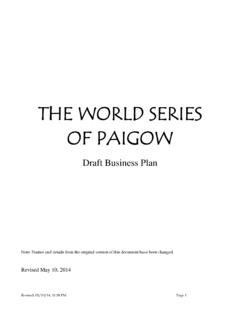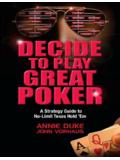Transcription of Legg Mason Funds Inc. Michael J. Mauboussin …
1 Legg Mason Funds Management, Inc. May 24, 2004 decision - making for Investors Theory, Practice, and Pitfalls The fundamental law of investing is the uncertainty of the future. Peter Bernstein Individuals who achieve the most satisfactory long-term results across various probabilistic fields tend to have more in common with one another than they do with the average participant in their own field. Distinguishing features of probabilistic players include a focus on process versus outcome, a constant search for favorable odds, and an understanding of the role of time.
2 Success in a probabilistic field requires weighing probabilities and outcomes that is, an expected value mindset. One key to success is a high degree of awareness of the factors that distort judgment. Legg Mason FundsManagement, Inc. Michael J. Mauboussin Page 2 Legg Mason Funds Management, Inc. ote: The quick brown x jumped over the lazy odle to increase market are. Looking Outside to Understand What s Within Sorting skillful and lucky participants is not easy in a probabilistic field like the stock market. Markets tend to express the likelihood of various outcomes, making the financial proposition a fair game (excluding transaction costs).
3 For example, the odds on the tote board reflect each horse s chance of winning. Research shows that handicapping accurately predicts actual results over time. 1 The investment community values the ability to distinguish between skill and luck highly because long-term results can make the difference between meeting and falling short of future liabilities. With rare exception, the academic finance community believes that even trying to identify skillful investors is a futile exercise. If markets are efficient, the thinking goes, your return over time will reflect the risk you assume net of costs. Academics generally consider investors with superior results lucky rather than skilled.
4 If investing is a fair game like a coin toss, and you start with a sufficiently large sample, some percentage of the group will do well by virtue of chance. 2 The key notion is that it s impossible to know ahead of time which investors will end up as the lucky ones. Since you can t predict luck, academics recommend buying low-cost index Funds . Though practically sound, the academic advice ignores two critical facts. First, in almost any human endeavor, people have differential capabilities. The investing-is-a-coin-toss metaphor assumes that everyone has an equal chance of success or failure. We simply don t see this in the real world.
5 If you go to a baseball game, you won t see all .260 hitters; you ll see a m lange of skills. The same holds true for investors. 3 Still, differential capabilities are not enough. As we already noted, prices in probabilistic fields do make it look like a fair game, just as golf handicaps allow players of different skill to play on an equal footing. The second fact is that in each probabilistic field including investing, poker, handicapping, and sports team management certain individuals do consistently generate superior results. The combination of differential capabilities and existence of superior performers provides a basis for judging skill versus luck.
6 Individuals who consistently succeed in various probabilistic fields possess both superior skills and a dissimilar approach to others. In fact, these super performers appear to have more in common with one another than they do with the average participant in their own field. A great investor thinks more like a great handicapper than the average investor . We want to study the elite performers in probabilistic fields to see what traits they have in common. These traits will provide a guideline to assess skill versus luck in the investment business. In short, we need to look outside the investment business to understand skill within it.
7 Same Strokes for Different Folks We do not know what the future holds. We operate in a world where information is incomplete, facts are mingled with beliefs, and uncertainty reigns. An investor s goal is to understand how expectations for a company s future are going to change over time. This is no easy undertaking, especially since we humans are not well designed to grasp dynamic outcomes. How should investors approach decision - making ? We can begin by thinking in probability terms, because at the end of the day investing is inherently a probability exercise. Most investors acknowledge this point but very few live by it.
8 An investor s approach to decision making might be the single most important (and least explored) facet of the investment process. Strikingly, the best performers in all probabilistic fields tend to have a common and consistent approach that sets them apart from the average participant. This approach has a few key, related elements: 1. A focus on process versus outcome; 2. A constant search for favorable odds; 3. An understanding of the role of time. The elite performers also stay highly aware of the factors that cause their judgment to slip. Page 3 Legg Mason Funds Management, Inc.
9 Ote: The quick brown x jumped over the lazy odle to increase market are. This paper has three parts. First, we will review these three elements, drawing input from successful people in various probabilistic domains. Second, we go from theory to practice and explore the mechanics and nuances of expected value. Finally, we discuss some heuristics and their associated biases to see why we fail to properly calibrate probabilities and outcomes. The Right Stuff Process versus outcome. Long-term success in a probabilistic field requires a disciplined and economic process. Discipline does not mean inflexibility; top practitioners recognize circumstantial changes and continually adapt.
10 While satisfactory long-term outcomes ultimately define success in probabilistic fields, the best in their class focus on establishing a superior process with the understanding that outcomes take care of themselves. Probabilistic endeavors require a focus on process because, by definition, poor decisions will periodically result in good outcomes, and good decisions will lead to poor outcomes. Exhibit 1 is a simple two-by-two matrix that summarizes this point: Exhibit 1: Process and Outcome Matrix OutcomeGoodBadGoodDeserved SuccessBad BreakBadDumb LuckPoetic JusticeProcess Used toMake the DecisionOutcomeGoodBadGoodDeserved SuccessBad BreakBadDumb LuckPoetic JusticeProcess Used toMake the decision Source: J.












